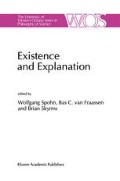Abstract
In logic texts, it is generally assumed that verbs denote properties of, or relations among, individuals. This is in marked contrast to the common view that verbs stand for events, actions, or states. In this paper I explore the common view about verbs. This quickly turns into a revised view, according to which it is whole ‘atomic’ sentences (of English) that do the denoting, not just the verbs themselves. This is then most naturally formalized as if sentences of English were singular terms within a version of free logic, with the true ones successfully denoting events, and the false ones failing to denote.
Access this chapter
Tax calculation will be finalised at checkout
Purchases are for personal use only
Preview
Unable to display preview. Download preview PDF.
Notes
I assume that ‘name-filling’ is like quantification in that it can occur at any of various stages; this accounts for the fact that names, as well as quantifiers, have’ scope’. In a logic such as Quine’s version of Russell’s, names of natural language are represented by quantifiers; in a free logic they are not; in either case they need to have scope. The treatment of names is well-studied and debated; I do not pursue it here.
Plato says: “… we have two kinds of vocal indications of being. … One called nouns, the other verbs. … The indication which relates to action we may call a verb. … And the vocal sign applied to those who perform the actions in question we call a noun.” He goes on to refer to “… ‘walks’, ‘runs’,’ sleeps’ and the other verbs which denote actions.” Plato, Sophist 261D-262C.
Suppose that Brutus imagines Caesar as a tyrant, and also simultaneously imagines him as a griffin. Then the sentence ‘Brutus imagined Caesar’ may give trouble. For the description ‘e is an imagining & Agent (e, Brutus) & Object (e, Caesar) & ehappens at fwill apparently not be individuating’.
Author information
Authors and Affiliations
Editor information
Editors and Affiliations
Rights and permissions
Copyright information
© 1991 Kluwer Academic Publishers
About this chapter
Cite this chapter
Parsons, T. (1991). Atomic Sentences as Singular Terms in Free Logic. In: Spohn, W., Van Fraassen, B.C., Skyrms, B. (eds) Existence and Explanation. The University of Western Ontario Series in Philosophy of Science, vol 49. Springer, Dordrecht. https://doi.org/10.1007/978-94-011-3244-2_8
Download citation
DOI: https://doi.org/10.1007/978-94-011-3244-2_8
Publisher Name: Springer, Dordrecht
Print ISBN: 978-94-010-5430-0
Online ISBN: 978-94-011-3244-2
eBook Packages: Springer Book Archive

